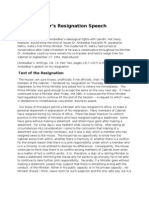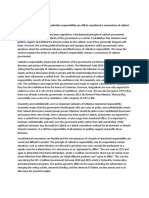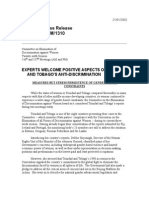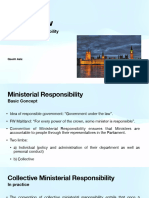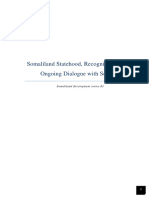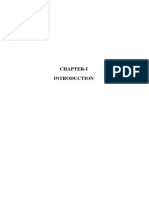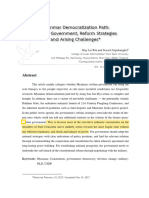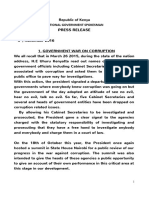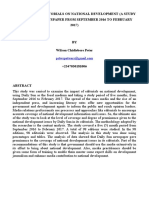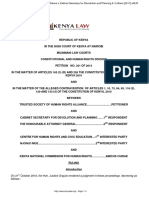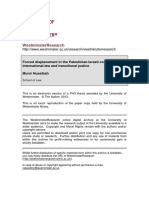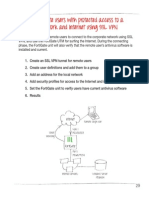INTRODUCTION
The case of Carltona Ltd v Commissioners of Works1 is the building foundation to the application of the
Alter ego theory in Tanzania. In a normal situation the one who is vested with a particular statutory
power must exercise it personally rather than delegating it, but in the case ministers practically they
cannot perform all their functions as they are so multifarious
So Civil servants of different departments in different ministries are there for assisting the ministers
responsible. However they are responsible for everything done in their respective ministries.
Alter ego is the Latin maxim which means “the other I”or ‘the second self’, the other I is a distinct from
a person’s normal or original personality. This theory is used in different disciplines of law among others
being, corporate law, criminal law and administrative law. ▪In administrative law the alter egomeans
that the minister as the head of the ministry and departments is responsible for each and everything
done by third parties (other than him) in the ministry regardless of the fact that he authorised them to
do so or not. The respective minister is answerable before the parliament for the decision made by
officials under his ministry. ▪Since the Ministers have multifarious function The Transfer and Delegation
of Power Act provides them with powers to delegate powers to any person to perform any duty vested
in him by written law. But it is not all duties are delegable, such duties which are not delegable include
duties conferred or imposed on him by the Constitution, make rules or to hear appeals and those which
he is expressly prohibited from delegating by any other laws
Ministerial Responsibility This doctrine explains how ministers are collectively and individually held
responsible for the actions done on their official capacities. In the parliament, all ministers represent the
government and are responsible to answer all such questions put against them by the members of the
parliament. An argument raised by one minister in the parliament has to be supported by other
ministers. Ministers work as one team in defending actions taken by the government and where such
actions are challenged in the parliament.
MAIN BODY
The applicability of alter ego theory in Tanzania has been verified and explained in the two levels
where found are
Collective ministerial responsibility
This refers to responsibility of all the ministers in defending any such action which has been taken by the
government and which reflects the image of the government at large. All ministers are responsible in
implementing any such resolution passed by the cabinet. If there is no mutual agreement on any matter
raised in the cabinet, then ministers will have to vote and the majority decision shall form the stand of
the government on the particular issue and all those who were not in agreement with the issue are
supposed to take the stand of majority otherwise one wihave to resign from the government. An
1
[1943] ALL ER 560
�example of the minister who went against the consensus of the cabinet and resigned was Augustino
Lyatonga Mrema in 1995. As per Article 54 of the Constitution of United Republic of Tanzania, the
chairman of the Cabinet is the President and members of the Cabinet include the vice-president, prime
minister, president of Zanzibar and all ministers. Article 53(2)2 of the Constitution establishes the
doctrine of ministerial responsibility particularly on collective ministerial responsibility
Individual ministerial responsibility
A minister is individually responsible in respect of such actions which arose under his ministry.If there is
any act taken by officials under a certain ministry, then the minister concerned shall be held responsible
by the parliament for such act. Where the minister fails to persuade the parliament on the actions taken
by his ministry in preventing any particular loss to happen, then such ministry will be forced to resign
from his office. Example of ministers who resigned from their posts in response of the pressure from the
parliament are Prof. Simon Mbilinyi, Iddi Simba, Kigoma Ally Malima etc.
Moral ministerial responsibility
In Tanzania this has been included in provision of the interim constitution and the election Act 1970.
Here all ministers, members of parliament, civil servants and official of the party must comply with the
leadership condition which are designed to ensure that opportunitys for clash of public and private
interest are reduce to the minimum. a leader or his spouse must not hold any office of a director in any
company incorporated or established in Tanzan;a or clsewhci'C, otherwise than as a nominee of the
Government or any statutory corporation or any company of which the majority of ordinary share., are
held by the Government or other public body;
The applicability of alter ego theory in Tanzania has been verified and explained in the quotation of
mwalimu Nyerere
Most important of all members must not under any circumstances attack a member of the civil service
in this house. If they believe a civil servant is acting wrongly and that injustice is in consequence being
done it is the minister whom members must call to account.. Then it is his task to investigate and if
necessary, to invoke the disciplinary procedures against the government servant
The theory of alter ego can be witnessed in Tanzania as ministers are responsible for everything going
on in their ministries and they are subjected to respond to all questions asked in the parliament
concerning their ministries. Sometimes ministers may resign when Compiled Notes on Administrative
Law in Tanzania-Moshi Co-operative University-LLB (2016-17) - 99 - they fail to explain or justify
misconducts in their ministries. This is supported by different matters that have risen. These cases were
The former President Ali Hassan Mwinyi, while he was a Home Affairs Minister. In a charge of witchcraft
in Mwanza, a lot of people died under torture while they were being investigated under police custody.
Through investigation, the police used dirty methods of torture. He resigned under the doctrine of
Individual Responsibility in 1974.
2
The construction of the united republic of Tanzania of 1977 amended time to time
�Another recently matter is that of Hon. Margret Sitta, when she was a Minister of Education and Culture
there was leakage of NECTA exams in the year of 2006 and so, as a minister was accountable to the
parliament and when she was asked to justify, she had to do so although she was not the one who
caused the leakage of exams.
The applicability of alter ego theory in Tanzania has some weaknesses, these weaknesses are as
follows
It leads to irresponsibility to the public servants, this is because they know that they are doing wrongs
within their departments but still not responsible for their wrongs caused, this creates a great problem
to the officials of being irresponsible and not taking good care for ensuring good administration when
performing duties in their particular departments, and instead ministers are being responsible.
Another weakness of the applicability of the alter ego theory in Tanzania is that, ministers thought that
it is for their own misconduct or fault which can mount to their responsibility but not for the misconduct
which has been caused by the officials under their ministries. For instance, Transport minister Mr Omari
Nundu, said he would not resign because he had done nothing wrong to warrant the move
Shortcomings of the doctrine of ministerial responsibility/Alter ego theory in Tanzania
The doctrine presumes that the minister knows each and everything within his ministry while in actual
sense he is not.
The president appoints ministers among the members of the parliament and therefore weakens the size
of members of the National Assembly who remain to question the government.
Multiparty system may be fruitless in as far as making the government accountable to the parliament
where most of members of the National Assemble are from the ruling party and therefore will tend to
defend their government against those of opposition parties.
The fact that the minister has failed to perform his duties effectively in one ministry does not bar the
President from appointing him to head another ministry








